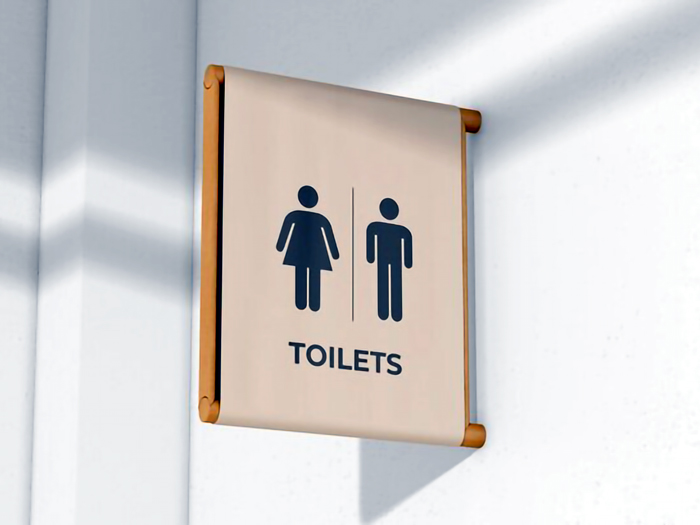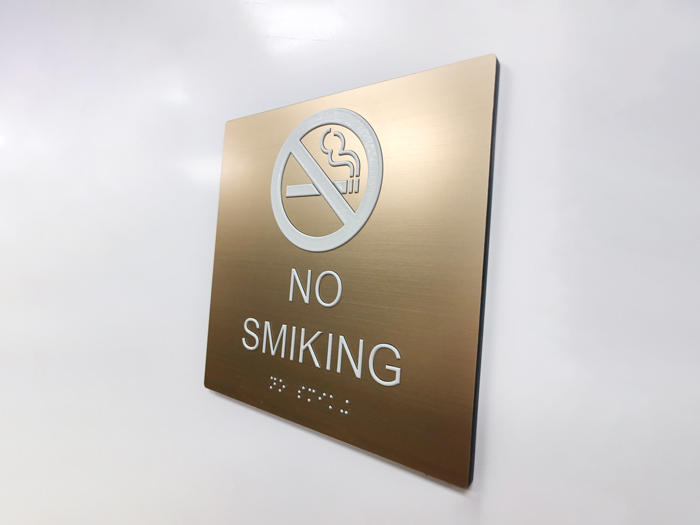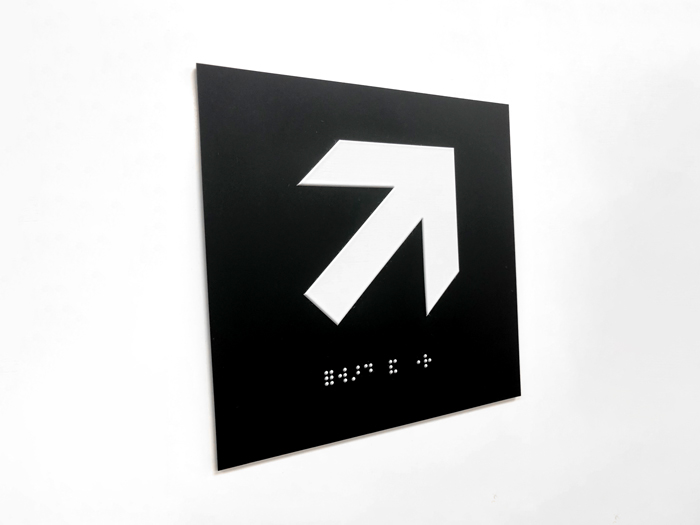ADA Signs
Every business needs to be ADA Complaint. Here at Brooklyn Signs, we have the fabrication tools needed to craft any type of ADA sign, and the experience to make sure that each one falls within the appropriate guidelines and regulations. Trust Brooklyn Signs with all your ADA signage needs. Call today.
ADA Signs Maker: Ensuring Accessibility for Everyone
ADA signs are more than just a regulatory requirement; they are a crucial element in breaking down barriers for people with disabilities, facilitating ease of navigation and access in various settings. The absence of these signs can lead to confusion, inconvenience, and even exclusion for a significant portion of the community.
At Brooklyn Signs, we understand these challenges and offer a solution that not only addresses compliance but also enhances the functionality and aesthetics of your space. Our expertise lies in crafting ADA signs that are clear, durable, and thoughtfully designed to fit seamlessly into your environment. With over 30 years of experience in creating ADA-compliant and braille signs, we have honed our skills in fabricating signs of all shapes and sizes, ensuring each one meets the highest standards of quality and compliance.
Whether you are well-versed in ADA requirements or seeking guidance to make your signs compliant, Brooklyn Signs is here to lead the way. Learn more about our bespoke ADA signage solutions or get started on your project today by calling us at (718) 252-7575.

What are ADA-Complaint Signs
ADA signs are designed to make public spaces accessible to all individuals, including those with disabilities. These signs are not just a legal requirement; they are a commitment to inclusivity, ensuring that everyone, regardless of their abilities, can navigate and access facilities with ease and dignity.

- Braille and Tactile Characters: They include Braille for visually impaired individuals and raised tactile characters that can be felt with touch.
- High Contrast and Non-Glare Surfaces: ADA signs are made with high-contrast colors for easy visibility and have non-glare finishes to ensure they are easy to read under different lighting conditions.
- Specific Font Requirements: The fonts used on ADA signs must be easy to read, typically with simple, sans-serif typefaces and appropriate letter spacing.
- Size and Spacing: The size of the text and Braille on ADA signs is regulated to ensure readability for those with visual impairments.
- Installation Location and Height: ADA signs are placed at specific heights and locations, such as next to doors or along hallways, to ensure they are easily reachable and readable by individuals in wheelchairs.
- Pictograms: When used, pictograms must be accompanied by descriptive text and Braille. They should be in a designated field with a raised border.
- Directional and Informational Signage: ADA signs include directional and informational signage to help individuals with disabilities navigate buildings and facilities.
- Compliance with Local and Federal Regulations: ADA signs must comply with both local and federal guidelines to ensure accessibility standards are met.
Understanding ADA Signs & Compliance
ADA signs are essential in public buildings, schools, hospitals, workplaces, and other facilities to promote inclusivity and ensure that individuals with disabilities have equal access to information and navigation. Compliance with ADA guidelines for signage is not only a legal requirement but also a step towards creating a more inclusive and accessible environment for everyone.
The placement of ADA signs is as crucial as their design. Signs need to be installed at specific heights and locations to be accessible to individuals in wheelchairs. Our team ensures that every sign is strategically placed for maximum accessibility.











Custom ADA Signage for Your Business
- High Contrast Colors: Enhanced visibility and readability with carefully selected color palettes.
- Anti-Glare Finish: Ensures legibility under various lighting conditions, making the signs easy on the eyes.
- Raised Lettering: Not just for compliance, but also adding a tactile, stylish element to the design.
- High-End Plastic: Durable and versatile, suitable for a wide range of applications.
- Bronze, Brass, and Copper: These premium materials are available for custom orders, adding a touch of elegance and distinction to your signage.
Benefits of ADA Braille Signs
ADA signs enhance accessibility and safety in public spaces, ensuring inclusivity for individuals with disabilities. They also help businesses comply with legal standards, reinforcing a commitment to social responsibility and a positive brand image.

Accessibility
They make public spaces more navigable for individuals with disabilities, especially those with visual impairments, by providing tactile information (like Braille) and clear visual cues.

Legal Compliance
ADA signs are required by law in public buildings and commercial spaces in the United States. Compliance helps avoid legal penalties and demonstrates a commitment to equality.

Safety & Navigation
ADA signs often include important safety information, guiding individuals to exits, stairways, elevators, and accessible pathways, which is crucial in emergencies.v

Reduced Risks of Accidents
Clear signage can help reduce the risk of accidents, which is beneficial for all visitors, not just those with disabilities.

Community Responsibility
ADA signs reflect a commitment to social responsibility and community welfare, contributing to a more equitable society.

Versatlity
Modern ADA signs come in various designs and materials, allowing them to blend seamlessly with the building’s aesthetics while still being functional.
Contact Brooklyn Signs Today for ADA Signs
Our expertise in ADA signage ensures that your business not only complies with legal standards but also embraces the spirit of inclusivity.
We offer tailored, professionally designed ADA signs that blend seamlessly into your space’s aesthetic while addressing the practical needs of all visitors.
Frequently Asked Questions and Resources
ADA(Americans with Disabilities Act) are basically the signs that are installed to help the people with disabilities. These signs are basically used to help people with disabilities to access public areas easily. People who are responsible for buildings like compartment complexes or offices are required to put up these signs in specific places so that they can help people with disabilities to navigate easily.
Sans serif fonts are ones that are as plain and straight as possible, increasing the ease of readability. The signs should also have large fonts (5/8 and 2 inches). The fonts should not be italic, highly decorative or script. The main goal of this signage is to help people.
Yes, the businesses and residences are required by the ADA to make reasonable accommodations for people with disabilities. But these signs are required for only those businesses that comply under the ADA rules. The small businesses that don’t serve the public are not required to put ADA signs.
Yes, custom colors can be used for ADA signs. The standard ADA signage colors are blue, black, or dark brown. Green on red or red on green should be avoided as they are not color blindness. The colors that are most visible should only be used.
The standard sizes for these ADA signage is 18 x 18 inch. The signs should be placed in such a way that a clear space is provided beyond the arc of the door. The signs that are placed overhead should have a minimum of 80 inches clearance from the finished floor to the bottom of the sign.
The tactile signs are the signs that are for blind people; can be read by the touch of hand. Braille(3D bumps on the signs), raised pictograms, symbols or prints are examples of tactile signs.
These signs are customizable but there are some conditions under the ADA law but some of the materials that can be used to craft these signs include brass, bronze, copper, and high end plastic.

